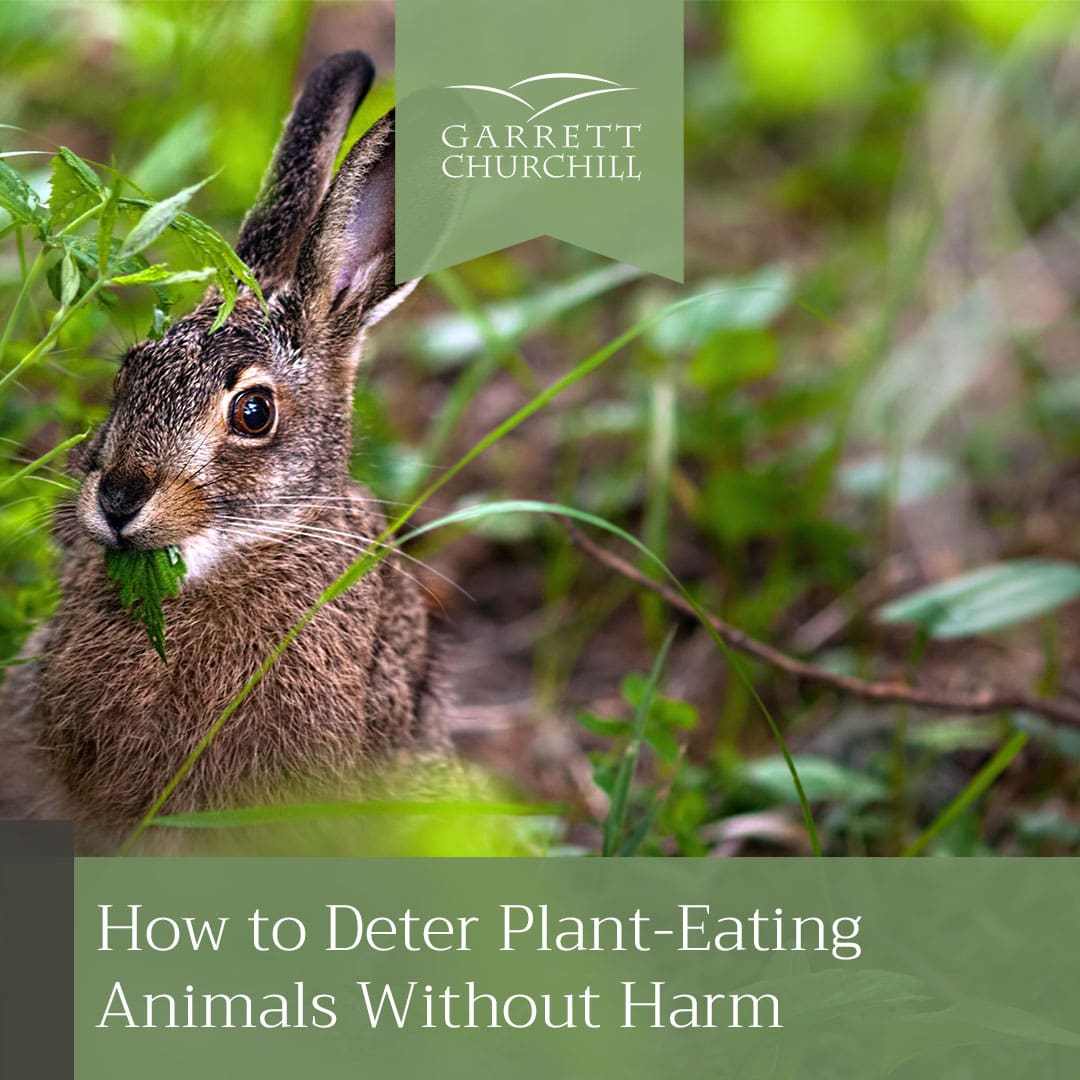How to Deter Plant-Eating Animals Without Harm
After a diligent, well-planned planting season, there’s nothing like the satisfaction that comes with a vibrant garden in full bloom.
But, as many planters know, wild animals can quickly wreak havoc on beautifully designed landscapes. Whether it’s holes and tunnels scattered throughout the yard or deer and rabbits snacking on the fruits (and veggies) of our labor, backyard critters can be quite unwelcome guests.
Protecting your plants is one thing. Even if you really don’t mind sharing your space with local wildlife, though, your yard really shouldn’t be a free-for-all for critters that could potentially be carrying parasites and disease.
Keep reading for some expert tips for deterring plant-eating animals without harm.
Common Plant-Eating Wildlife
While the specific critters that crash your garden parties can vary based on what you’ve planted, there are a few common garden pests to be aware of, including:
- Deer
- Rabbits
- Birds
- Groundhogs
- Squirrels
- Raccoons
- Chipmunks
(Not to mention various creepy crawlies such as aphids, worms, caterpillars, spotted lanternflies, slugs, snails, and more.)
As much as you may be tempted to lather your lawn in poisonous pest repellants, we strongly advise against this option. In addition to harming innocent-but-hungry wildlife, toxic repellants may also hurt pets or other animals that are not a threat to your yard.
6 Ways to Deter Plant-Eating Animals Without Harm
Fortunately, protecting wildlife and protecting your plants aren’t mutually exclusive.
Here are a few of our favorite ways to harmlessly, humanely deter plant-eating animals from our yards and gardens:
-
Fence
Whether you’re trying to protect your garden from wildlife or your own pets, a fence is one of the most foolproof ways to keep animals out of your space.
The size and material of your fence will depend on a few factors such as budget, design preferences, and common garden culprits. Some individuals choose to fence in their entire yards; others prefer to simply keep their garden area enclosed.
Keep in mind that deer can jump pretty high, so a deer-deterring fence will need to be at least eight feet high. You can also add a second fence or fence off a specific area with no internal space for animals to land should they hop over your handiwork.
To prevent rabbits and groundhogs from burrowing underneath your fence, try to install it between 10-12 inches underground. That said, birds can fly around any fence you choose to install.
-
Plant Covers
If you’ve got plant sections on the smaller side, you may find that plant covers offer sufficient protection. For example:
- Wire cloches or chicken wire
- Bird netting
- Squirrel baffles, or domes that hang on trees or bird feeders to keep squirrels away
-
Raised Garden Beds
While they may not do much about your deer problem, you may have better luck keeping small creatures away by installing a raised garden bed. Plus, if you have a home with a small yard, a raised garden bed is a great way to maximize your space.
Whether you prefer to DIY or purchase ready-made materials, there are seemingly endless design options to choose from to fit your aesthetic.
-
Homemade Repellents
Ask any long-time gardener about their favorite homemade wildlife repellants, and you’re sure to hear some variation of a few different methods for keeping deer, rabbits, and more at bay.
For example:
- “Deer juice,” made of water, eggs, milk or yogurt, crushed garlic, and cayenne pepper
- Hot sauce
- Irish Spring soap
- Red pepper flakes
Of course, you can also try commercially available repellant sprays—just make sure they’re non-toxic.
-
Scare Tactics
Some animals are more easily frightened than others, so scare tactics may only work for a portion of your problem. (And by “scare tactics,” we simply mean noises and movements to deter plant-eating animals from your otherwise peaceful garden.)
Try setting up motion-detecting sprinklers, installing wind chimes, or turning on some music, for example. If you’ve got a protective pet, some barking and chasing may also do the trick!
-
Pest-Repelling Plants
One of the best ways to deter animals from your garden? Reduce the temptation!
If deer and rabbits aren’t enticed by your plants, they’re much more likely to leave them alone. If you have an herb garden, you may have noticed that this section of your yard tends to get fewer visitors—that’s because highly aromatic plants tend to be relatively deer-resistant.
Plant some strong-smelling plants such as lavender, onion, catnip, sage, or thyme, in addition to prickly, fuzzy plants to encourage your yard guests to look elsewhere. Plant them around the perimeter of your garden or yard, or try interplanting them with the rest of your plants to make them less appealing overall.
Because hungry critters can be persistent, we recommend trying a combination of the above-listed methods, keeping in mind that it may take some trial and error before you find what works best for protecting your yard.
Looking for strategically designed landscaping to keep critters at bay? Our creative experts can help. Visit http://garrettchurchill.local/ to learn more.
